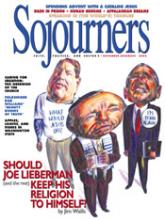Once again Saddam Hussein has made the task of ending sanctions against the people of Iraq more difficult. By rejecting the new U.N. arms panel, Baghdad has dismissed a plan that could lead to the suspension of sanctions and end an ordeal that has taken the lives of hundreds of thousands of Iraqi children.
The provisions of the new U.N. Monitoring, Verification and Inspection Commission (UNMOVIC) were designed to be more favorable to Iraq than those of the previous U.N. commission. The new team of 44 inspectors is drawn from 19 different countries rather than predominantly from the United States and Great Britain. The inspectors now report directly to the U.N. secretary general, who has shown a strong interest in ending the Iraq crisis. UNMOVIC is charged with providing a list of final inspection tasks that is specific and finite rather than open-ended. Under the terms of the plan, sanctions could be suspended within nine months of UNMOVIC beginning its work in Iraq.
Iraq's rejection of UNMOVIC raises suspicions that the regime may have something to hide and that even the more lenient inspections of the new agency might uncover prohibited military capabilities. Much of Iraq's weapons program was dismantled during previous U.N. inspections, but some arms experts are worried that Baghdad may be attempting to rebuild its military capacity.
Iraq's defiance may also reflect its long-term strategy of attempting to wear down the resolve of the U.N. Security Council in the hopes that sanctions will simply collapse. Whatever the motivation, Saddam Hussein has shown again that he is more interested in pursuing his military and political ambitions than relieving the suffering of his people.
Read the Full Article
